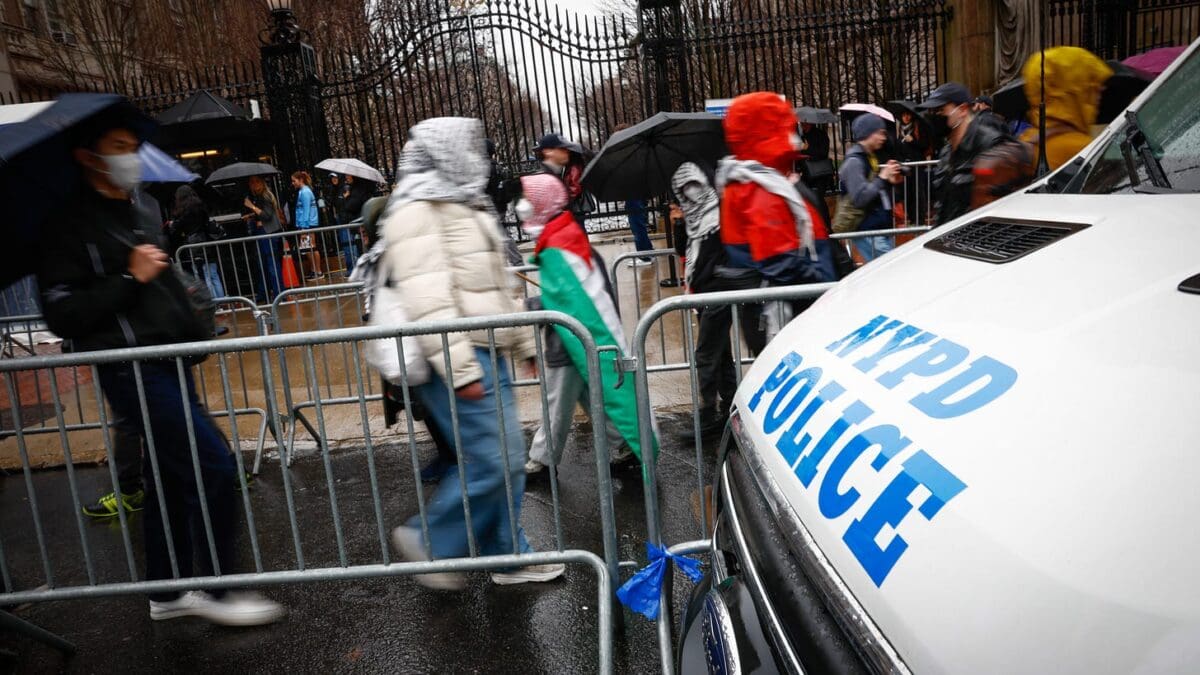
Utah Ex-Therapist Scott Owen Sentenced to Prison for Sexually Abusing Patients
April 3, 2025
RFK Jr. wants to stop people using SNAP benefits to buy soda. Will it help?
April 3, 2025THE ELITE UNIVERSITIES, which loom large in MAGA demonology as a bastion of the left and an incubator of the woke mind virus, were bound to be a prime target for Donald Trump’s political Kulturkampf in his second term. The anti-Israel protests that have rocked many campuses since late 2023—often rife with aggressive behavior, extremist rhetoric, and outright hostility toward Jewish students—have provided a convenient pretext for this attack. The Trump administration’s malfeasance does not excuse the real and multiple failings of American academia. But those failings should not obscure a fundamental fact: the administration’s moves against universities are part of a lawless siege against all institutions seen as hostile to Trump and Trumpism.
The first volley was fired early last month at Columbia University—a shrewdly chosen target, since the chaos at Columbia has been particularly visible. On March 7, a joint statement from the Justice Department, the Department of Health and Human Services, the Department of Education, and the General Services Administration announced the cancellation of $400 million in federal grants and contracts to Columbia due to “inaction in the face of persistent harassment of Jewish students.” A follow-up letter to the university’s leadership listed the steps required before restoration of the funding could even be discussed: toughen and centralize discipline, institute clear rules for protests (including a ban on non-health-related masking), adopt a formal definition of antisemitism, reform admissions, and place the Middle Eastern, South Asian, and African Studies Department under “academic receivership”—which replaces faculty governance with oversight by a school administrator—for at least five years.
On March 21, Columbia issued a statement on its “work to combat discrimination, harassment, and antisemitism.” The document made no mention of the school’s clash with the Trump administration, and some of the announced changes—an effort to promote “intellectual diversity among faculty,” a commitment to “institutional neutrality,” and programs to encourage civil discourse and disagreement—were not part of the administration’s demands. Still, the statement clearly came across as a de facto capitulation—and a signal to the sixty other colleges being investigated by the administration on similar pretexts.
The next shoe didn’t take long to drop. This week, the administration announced that it is reviewing Harvard’s $255.6 million in current contracts and $8.7 billion in multiyear grants, and that it has suspended “several dozen” research grants at Princeton—all as part of an ostensible inquiry into campus antisemitism.
MANY PEOPLE GENERALLY CRITICAL of the Trump administration’s rampage through American institutions have nonetheless responded to the moves against universities with some ambivalence. On Tuesday, the progressive Jewish website the Forward published an op-ed warning that we should be able to critique Trump’s crackdown without dismissing or downplaying the problem of antisemitism on the pro-Palestinian campus left. The article is representative of the position taken by numerous centrist commentators, including Harvard professor and president emeritus Lawrence Summers. Others further to the right have argued that the Trump administration’s actions were coercive but justified; that Columbia’s leaders might be secretly grateful for the intervention since it gave them an excuse to rein in the campus radicals; and that the administration should use the same playbook nationwide and purge universities not only of antisemitism but also of “left-wing racialism.”
There’s a reasonable basis for some amount of ambivalence here: Problems with antisemitism at Columbia, and on a number of other campuses, have been real and serious. The Columbia protests that began in late 2023 and intensified in spring 2024 included not only episodes of vandalism and violence, but unquestionable abuse and noxious rhetoric toward Jews, usually under the guise of imprecations against “Zionists.” Many of these excesses, including direct harassment of Jewish students and disparaging remarks that implicitly conflated “Zionists” and “Jews,” were documented in an August 2024 report from a task force Columbia convened to address campus antisemitism. Such a climate, Brooklyn College history professor KC Johnson pointed out in an email interview, was also clearly inimical to academic freedom, undercutting Columbia’s moral authority to defend it.
While the university took some action to curb the mayhem—scores of protesters were arrested last spring, and in the fall campus access was limited to those with a university ID—critics saw little strength or firmness in the approach. (For instance, most students arrested in the spring were permitted to return to campus in the fall.)
Does Columbia’s situation warrant intervention under Title VI of the Civil Rights Act, which prohibits discrimination on the grounds of race, color, or national origin in educational institutions receiving federal assistance? It might—but certainly not the kind of intervention that the Trump administration has pursued. As explained in a statement by eighteen politically diverse constitutional scholars, federal law does not authorize unilateral summary cancellations of funding—instead, a detailed process must be followed before federal funds can be withheld:
Under Title VI, the government may not cut off funds until it has
conducted a program-by-program evaluation of the alleged violations;
provided recipients with notice and “an opportunity for hearing”;
limited any funding cutoff “to the particular program, or part thereof, in which . . . noncompliance has been . . . found”; and
submitted a report explaining its actions to the relevant committees in Congress at least thirty days before any funds can be stopped.
These requirements aim to ensure that any withdrawal of funds is based on genuine misbehavior on the university’s part—on illegal toleration of discriminatory conduct, not just on allowance of First Amendment–protected expression.
Naturally, such procedural niceties don’t have a place in the Trump administration’s shock-and-awe strategy. While the administration’s letter to Columbia mentions “violations of Title VI and Title VII” (the latter of which covers religious discrimination), its strong-arm move against the school appears to bypass these laws altogether, instead relying on the government’s authority to terminate contracts “for convenience.” Yet this is also likely illegal: conditions attached to federal grants—or their termination—may not, as a matter of law, violate “other constitutional provisions,” including First Amendment and due process rights.
Tyler Coward, general counsel for the Foundation for Individual Rights and Expression—which has been working on campus-speech issues since 1999—finds the Trump administration’s disregard for procedural norms deeply troubling, even aside from the specific actions the administration wants Columbia to take. “This ad hoc ‘We think you violated Title VI, therefore your funding’s gone, and oh, by the way, here’s a list of demands to start negotiating’—I think that’s a real problem,” Coward told me in a telephone interview. FIRE board member Nadine Strossen, president of the American Civil Liberties Union from 1991 to 2008, was even more blunt: She characterized Trump’s actions as “illegal and unconstitutional.” (I suppose that just means it’s another day of the week ending in “y.”)
The specific demands the Trump administration made to Columbia also raise grave concerns, some of which Coward discusses in a post on FIRE’s website. For instance, the administration’s letter strongly suggests that the school’s anti-discrimination policies should incorporate the International Holocaust Remembrance Alliance’s working definition of antisemitism. Yet that definition’s own principal author has cautioned that it should not be used as a basis for speech codes, since IHRA’s examples of contemporary antisemitism include political rhetoric attacking Israel. While such rhetoric obviously can be a vehicle for anti-Jewish hate, it is still protected by the First Amendment and by the principle of academic freedom (up to the point where it crosses the line into harassment). Columbia’s adopting the IHRA’s working definition of antisemitism would risk chilling or even suppressing constitutionally protected political speech.
It is also worth noting that, while both Columbia and Harvard have been credibly accused of tolerating progressive antisemitism and disruptive protests, Princeton—the latest target of the administration’s crackdown—faces no such accusations. As the New York Times notes, the university “quickly quashed” an attempt to create a pro-Palestinian encampment last year and has “managed to avoid much of the turmoil” that has beleaguered other Ivy League schools. It’s almost as if the Trump administration’s decision to put the screws on the universities isn’t actually about reining in antisemitism on campus at all.
THIS ISN’T TO DISCOUNT hypocrisy on the other side. Condemnations of the Trump administration’s assault on academic freedom often come from people who have ignored such assaults from the left—right down to the use of civil rights laws as a justification for speech restrictions, which FIRE has long decried. For all the absurdly hyperbolic claims of a quasi-Maoist “woke” reign of terror on college campuses, the actual cases of speech suppression in and out of the classroom are bad enough.
Strossen notes that some of the measures outlined in Columbia’s recent statement, specifically support for intellectual diversity and civil discourse and debate, are “needed reforms”—ones that academic freedom advocates had previously urged the school to implement, to no avail. But she finds it “distasteful” to see such policies adopted in response to “government coercion or pressure.” For right-wing culture warriors, on the other hand, the use of government coercion to wrestle the academic left into submission is not a bug but a feature.
But the Trump administration’s move to yank the funding from noncompliant universities exists in a larger context. This context includes:
-
U.S.-funded media outlets such as the Voice of America and Radio Liberty/Radio Free Europe are being dismantled, in part for the offense of featuring material critical of Trump (although a judge’s order last week forced the administration to reinstate funding for RFE/RL).
-
Trump is using executive orders to retaliate against law firms that were involved in cases against him, bludgeon them into concessions, and intimidate any attorneys who may consider taking actions against the administration.
-
Trump is using lawsuits to bully media organizations whose reporting has displeased him—and suggesting, in a speech at the Department of Justice, that a wide range of media outlets critical of him, particularly CNN and MSNBC, are engaged in “totally illegal” behavior.
-
Trump is making unprecedented moves to bring art centers and museums to heel.
-
The machinery of the state has been deployed to arrest, and seek to deport, a foreign student (Tufts grad student Rumeysa Ozturk) whose reported sole offense was a pro-Palestinian op-ed—as well as green card holders who have participated in anti-Israel campus protests but have apparently done nothing illegal (Columbia grad student Mahmoud Khalil).
The list could go on, but you get the picture. If these are the trees, we can call the forest what it is: Trump’s authoritarian power grab.
Concerns about illiberal leftism on college campuses, and especially its antisemitic manifestations, are obviously still valid, even in this context. But no one who is genuinely concerned about either illiberalism or bigotry can see the Trump administration as a genuine ally in the fight against those things. And, regrettably, even real attempts by universities to combat them can create larger problems if they are offered as concessions in response to the administration’s authoritarian bullying. Summers, who only recently criticized Harvard for inaction on antisemitism, had it right when he wrote, of Columbia’s surrender:
I cannot judge, because I do not have many of the relevant facts, the wisdom or necessity of the steps taken.
But this kind of bending of the knee by major institutions, if continued, threatens American democracy.
Great Job Cathy Young & the Team @ The Bulwark Source link for sharing this story.





